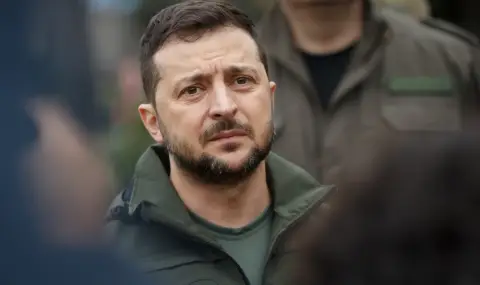The US deployed an advanced air defense system and dozens of troops this week to protect Israel from Iranian ballistic missiles. However, there is no similar assistance for Ukraine, which is under daily attack by Russian drones, missiles and bombs, notes "Politico", quoted by News.bg.
In Kiev, this is perceived as a double standard.
"If allies are shooting down missiles over the Middle East, why is there still no decision to shoot down drones and missiles over Ukraine?" — Ukrainian President Volodymyr Zelensky asked last month.
On October 1, American and British air defense systems and fighter jets helped shoot down hundreds of Iranian missiles. Afterward, the Ukrainian Foreign Ministry said: "We call on Ukraine's allies to defend our airspace with the same determination, recognizing that human life is equally valuable in every part of the world."
The reason the United States is acting boldly in Israel and cautiously in Ukraine is clear: Russia is armed with nuclear weapons, while Iran is not.
"The difficult answer, which Ukrainians may not want to hear but is unfortunately true, is that we can take the risk of shooting down Iranian missiles over Israel without provoking a direct war with Tehran that could lead to nuclear war," a senior U.S. Senate aide who works on Ukraine policy told Politico. “The risk is much greater with Russia.”
Two Biden administration officials, speaking on condition of anonymity, echoed that sentiment. They said sending U.S. forces into Ukraine to shoot down Russian missiles could trigger a direct military confrontation between the world’s two largest nuclear powers, with potentially apocalyptic consequences. In the Middle East, however, the U.S. could shoot down missiles over Israel without provoking war with a nuclear-armed adversary.
Iran has enriched nuclear material to near-weapons-grade levels, but has not attempted to build a nuclear bomb.
"It’s sad to watch this as an ordinary citizen of Ukraine — when your country is sacrificed in an agreement to prevent escalation by Moscow," said Mykola Belieskov, a research fellow at the Ukrainian National Institute for Strategic Studies.
There has long been active but distant involvement by allies when Russia attacks Ukraine.
"Our allies usually signal the movement of Russian bombers to firing positions. They let us know when and where the Russians are preparing an attack," said Yuriy Ignat, a spokesman for the Ukrainian Air Force.
After receiving warnings, thousands of soldiers from reconnaissance, communications and mobile air defense units go into action.
Russian drones have also strayed over Poland and Romania — EU and NATO members. In response, they have scrambled planes, but so far have observed Russian weapons without shooting them down.
Kiev wants Poland and Romania to intervene actively both in their own airspace and over western Ukraine. In a recent mutual security agreement, Kiev and Warsaw agreed to discuss the possibility, but Poland has so far not changed its policy.
Polish Defense Minister Wladyslaw Koscienniak-Kamiś said that Poland would not act without the full support of NATO, and such support is lacking. Washington also does not want an escalation of the conflict with Russia.
Kiev hopes that the shooting down of missiles and drones over Ukraine will be negotiated, similar to the provision of Western artillery, tanks and aircraft, which were eventually handed over despite initial concerns about crossing "red lines" of Russian President Vladimir Putin.
The accusations of double standards reflect broader frustration in Ukraine that the Biden administration is not doing enough to help Kiev stop Russian attacks. That includes slow arms deliveries and restrictions on the use of long-range American munitions on Russian territory.
"There is still a lot the United States can do to help Ukraine in its fight against Russia," said Shelby Magid, deputy director of the Atlantic Council, a Washington-based think tank.
American officials acknowledge that they are aware of the growing frustration in Ukraine, but say they are working on new arms deliveries that hope to allay those concerns.
